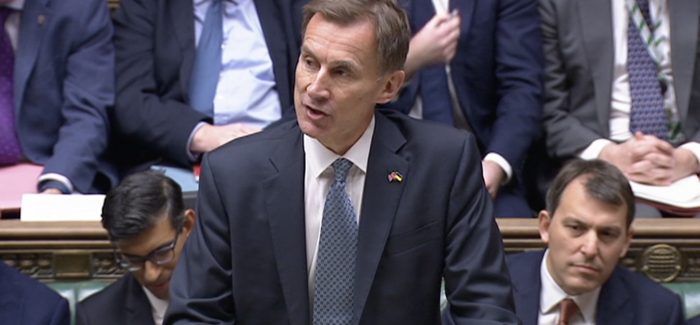Farming organisations have being issuing their response to the Autumn Statement delivered by Chancellor Jeremy Hunt today.
NFU President Minette Batters said there was much to be welcomed from today’s announcement, particularly on investment in research and development and the roll out of gigabit broadband technology to those hardest to reach rural communities.
“While we await further clarity, these commitments would enable Britain’s farmers to be more productive and efficient, while continuing to produce sustainable food and achieve ambitious net zero goals,” she said.
“Like other businesses, it’s rocketing costs for energy – central to producing our food – as well as huge hikes in feed, and fertiliser, which is putting Britain’s farmers and growers under the most intense pressure. We expect an announcement on future support for businesses before Christmas and it is vital this new targeted approach for business beyond next April includes UK food production and the food supply chain.
“With a safe, affordable domestic food supply being central to our nation’s success, we believe there are robust grounds for the government to classify our industry as a vulnerable sector when it comes to energy provision.
“We also heard from the Chancellor today committing that government departments will have their overall budgets increased in real terms. We trust this will allow Defra to deliver a properly-funded Agricultural Transition Plan to ensure Britain’s farmers have the confidence to invest and grow their businesses, in turn, enabling British food, farming and the country to thrive.”
Sean McCann, Chartered Financial Planner at NFU Mutual, said the Chancellor’s main Income Tax change was to reduce the point the additional 45% rate becomes payable from £150,000 to £125,140 from April 2023, which is expected to raise £3.7bn over the next five years.
“Jeremy Hunt froze the tax-free personal allowance and the thresholds for paying 40% income tax and child benefit tax for an extra two years until 2028, which means more people will be dragged into paying higher rates of tax as incomes increase,” he said.
“One way to reduce the impact for those who find themselves moving into a higher tax band or being caught by the Child benefit tax charge is to pay more into pensions which reduces taxable income.
“The Chancellor is halving the annual tax-free Dividend Tax Allowance from £2,000 to £1,000 next year and then halving it again to £500 in 2024 in a move which will raise the government £3bn over the next five years. This will impact those farmers who trade as limited companies and pay themselves via dividends.
“Slashing the annual exemption for Capital Gains Tax from £12,300 to £6,000 next year and £3,000 in 2024 will raise £1.6bn over the next six years. This could impact farmers selling farmland or agricultural property that has increased in value since they acquired it. However, there has been no change to the Capital Gains Tax reliefs available which will be welcome news for many farmers.
“Although inheritance tax thresholds were frozen until 2028, meaning more families will be caught in the net, the Chancellor did not announce any changes to Agricultural or Business Property Relief, which can help reduce inheritance tax bills for farmers.”
Chris Walsh, farm specialist at NFU Mutual, said: “Doubling the energy support to £200 for families who use heating oil, liquified petroleum gas, coal or biomass this winter is one of the few benefits for farmers and rural people in the Chancellor’s Statement. However, these payments will only go a small way to offset increased costs.
“Businesses facing huge electricity and gas costs, in particular glasshouse growers and horticultural businesses, will be interested in the details of the new energy efficiency taskforce being introduced next year.
“Extending business rate reliefs for retail and hospitality until 2024 and increasing it to 75% up to £110,000 per business could help those farmers who have diversified into farm shops or cafes.”
Tony Goodger, a spokesperson for the Association of Independent Meat Suppliers (AIMS) said economic stability and growth were central to the statement, which also recognised the country’s ‘incredible strengths’ in areas such as manufacturing.
“For meat and poultry businesses to thrive they need certainly and we would have liked to have heard about a needs based approach to migrant labour, at least in the short term.
“However we do welcome the announcement that over 600,000 more people on universal credit people to meet with work coach ‘so they can get the support they need to increase their work hours or earnings’ and trust that this will also include training needs such as expanding the lifetime skills guarantee to include courses such as level 3 butchery and the promotion of the Food & Drink Careers Passport.
“The Chancellor has correctly identified UK energy efficiency and the need to remove the country from the vagaries of global markets and shocks. If this can be achieved it will help our member’s businesses to plan for better for energy input costs.”




